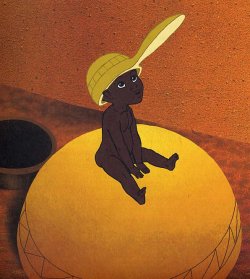KID MOVIE REVIEW: Kirikou and the Sorceress
- October 15, 2007
- By Dale McGowan
- In My kids, myths, Parenting, reviews
 9
9

A movie review for you this time — and oh my goodness, it’s hard to know where to start.
Desperate for something new for the kids, I happened on a film called Kirikou and the Sorceress in my Netflix recommendations. It had all the earmarks of a well-meaning flop, an animated parable based on African folktales — the kind of thing two Berkeley-educated bleeding-heart parents would make their kids sit through while eating Fair Trade seaweed crackers. But the viewer reviews were through the roof, so I took a shot.
And a flop, well-meaning or otherwise, it is not! Within three minutes we were all captivated by this surprising, funny, and uniquely moving animated film. A little boy walks out of the womb of his Senegalese mother, talking up a storm, and learns that the village into which he’s been born is under the thumb of the evil sorceress Karaba. His uncles have been eaten by the witch, and she has dried up the spring from which the villagers get their water.
[SPOILERS FOLLOW.]
His first question: Why is she so mean and evil? The adults are flummoxed by the very question: Does there have to be a reason?
As the adults alternately fight, cheat, and acquiesce to Karaba, Kirikou instead puts himself to the task of undoing the harm she’s done and of figuring her out. In the process, he learns that Karaba is the African equivalent of the man-behind-the-curtain — that most (not all) of her special effects have naturalistic explanations. She didn’t eat the men, for example, and a hidden animal is drinking up the water. He also learns that she is motivated by literal pain — a thorn — no, not in her paw, but in her spine.
The story also contains further evidence that the Christ story is only one version of a universal archetype, as little Kirikou sacrifices his own life to save the villagers — even those who rejected him — then is “resurrected.” And there is much rejoicing.
Also nice are the ways in which this hero paradigm does not parallel the classic western paragon. He is completely unpretentious, makes mistakes and cheerfully corrects them, changes his mind, and at one point, fatigued from his heroics, curls up in his grandfather’s lap for a rest.
Trust me on this one. 74 minutes. Ages 4-12.
[Pathetic sidenote:
The film’s content of natural nudity enraged some overseas distributors. Some requested airbrushing pants on the fully naked boys and men, as well as bras for the topless women. Michel Ocelot refused; this was African culture, and he wanted to stay faithful to it. In some countries, because of the distribution fights, it wasn’t released commercially until four years later.” (Wikipedia)
Allow me a moment to guess in which country most of this outrage was concentrated.]
Official website, including trailer
Netflix page
La version originale est en français!




